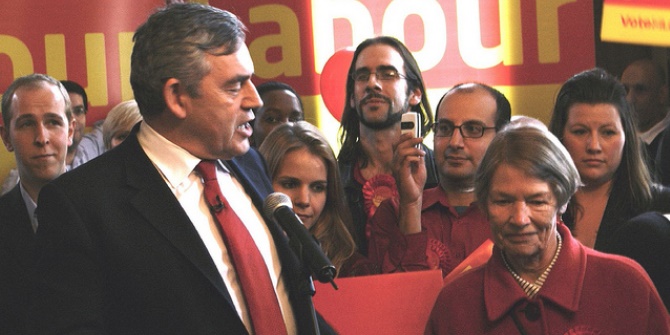 The current Coalition Government has notably protected the benefits and pensions enjoyed by older people, with political considerations likely key in its thinking. James Tilley argues that ageing as a psychological process entails a gradual gravitation towards parties that defend the status quo, which suggests that it is the Conservatives who are likely to benefit politically from Britain’s ‘ageing society’.
The current Coalition Government has notably protected the benefits and pensions enjoyed by older people, with political considerations likely key in its thinking. James Tilley argues that ageing as a psychological process entails a gradual gravitation towards parties that defend the status quo, which suggests that it is the Conservatives who are likely to benefit politically from Britain’s ‘ageing society’.
This article was originally published on the Democratic Audit blog.
David Cameron recently reaffirmed his government’s promise to maintain the ‘triple lock’ on state pensions which means that they will rise in line with prices, earnings or 2.5 per cent, whichever is highest. He also said he was ‘minded to keep’ a raft of universal benefits that pensioners receive such as winter fuel allowances and free bus passes. Given there is huge pressure to reduce government welfare spending, of which pensions make up around half, this might seem an old pledge to make. One explanation that has been advanced is that this is a sensible electoral decision for the Conservative party because older people are both more likely to vote and, crucially, more likely to vote Conservative.
In Britain age is indeed a strong predictor of vote choice, with older people much more supportive of the Conservatives and younger people much more supportive of Labour or the Liberal Democrats. This relationship has been a commonly remarked upon feature of the British political landscape for many years. For example, when I voted for the first time in the 1997 election, only 23 per cent of people my age, 20, voted Conservative. Yet 42 per cent of people my grandmother’s age, 80, supported the Conservatives.

Less clearly understood, however, are the processes that produce this observed association. In some recent research, Geoff Evans and I have investigated the underlying reasons why older people prefer the Conservative party. There are two main possibilities. The first is that as people age they become more likely to vote Conservative. This could be because the ageing process makes people more conservative (with a small c) and more resistant to change, or could be that older people are different in terms of their lifestyle and hence their interests. The second possibility is that it is not age that is important, but generation. Older generations of voters, brought up in very different circumstances to younger voters, are different.
Many have argued that there are long term processes such as increasing social liberalism among younger generations, in part, but not only, because of the pronounced growth of tertiary education and its effects on liberal values. This process of generational replacement is potentially significant electorally, as it implies that right-wing parties are fighting against ‘the tide of history’ on social liberalism. If generational replacement produces a more progressive electorate, then there will be a continued pressure on the Conservative party to either become more progressive or to accept social democratic hegemony. This process provides a clear alternative to an interpretation in terms of ageing and potentially heralds bad news for Conservative politicians as it means that their electorate is effectively dying out.
Working out which of these processes is going on is not straightforward however. If we take a survey in 2014 then we know that someone who is 50 years old was also born in 1964. It is thus very difficult to work out whether it is getting older that makes people different, or being born at a certain time that makes people different. In our article we use a wide variety of different data and techniques to try and estimate the two different effects. We do this by tracking the same people over time, seeing how their party choices change and then comparing those changes to the results of different elections. Taking the average of seven different groups of people over time (covering most periods between general elections since the 1960s) we find that the maximum possible ageing effect is a 0.38 per cent increase in Conservative voters per year, and the minimum possible ageing effect is only somewhat lower at 0.32 per cent per year.
These may not sound like very large effects, but over the course of a lifetime they add up. Even if only the minimum estimate is correct, the difference between 20 and 80 year olds is nearly 20 percentage points. This means that our estimate of ageing effects precisely explains the difference between 20 and 80 year olds that I mentioned earlier. We therefore conclude that the differences we see in the electorate are due to ageing, and not due to generational effects. The question of whether future Conservative support is threatened by generational replacement can therefore be answered with some confidence in the negative. Moreover the ageing effects that we see do not appear to result from compositional differences between the old and the young.
Holding constant levels of income, employment status and so on makes no difference to our findings. Our suggestion is therefore that it is ageing as a psychological process that makes people gravitate towards parties that defend the status quo, which in the British context is the Conservative party. This is in many ways a positive message for the Conservative leadership since the population as a whole is getting older. Moreover, this demographic benefit is doubly beneficial due to age differences in turnout: older people are also more likely to vote. In this sense, one could easily argue the tide of history is actually moving towards the Conservatives, not away from them.
This post is based on an article by James Tilley and Geoff Evans (2014) entitled ‘Ageing and generational effects on vote choice: Combining cross-sectional and panel data to estimate APC effects’, from Electoral Studies (1): 19-27. It represents the views of the author and not those of Democratic Audit, the British Politics and Policy blog or the LSE. Please read our comments policy before posting.
About the Author
 Dr James Tilley is a Lecturer in Quantitative Political Science at the Jesus College at the University of Oxford.
Dr James Tilley is a Lecturer in Quantitative Political Science at the Jesus College at the University of Oxford.







